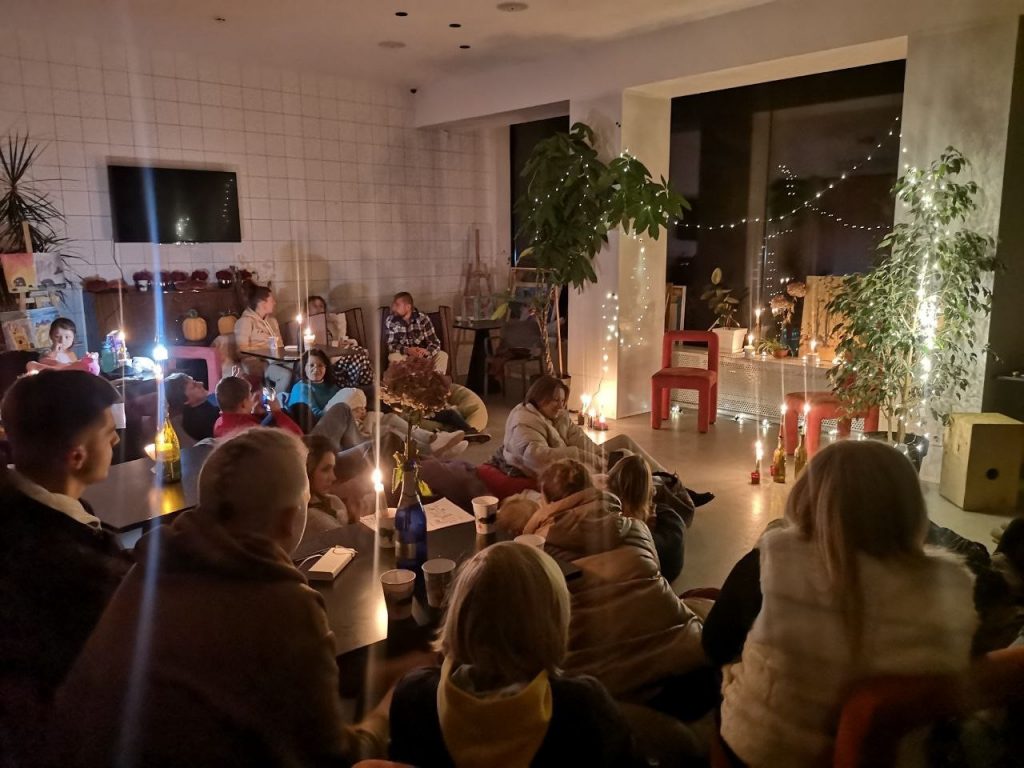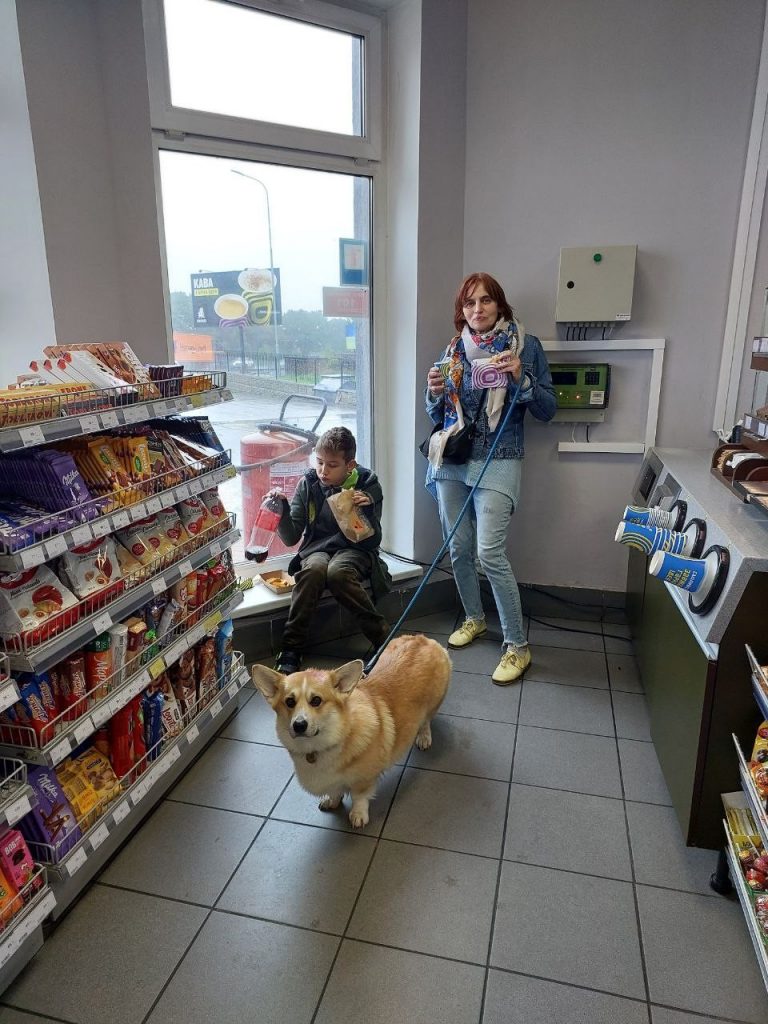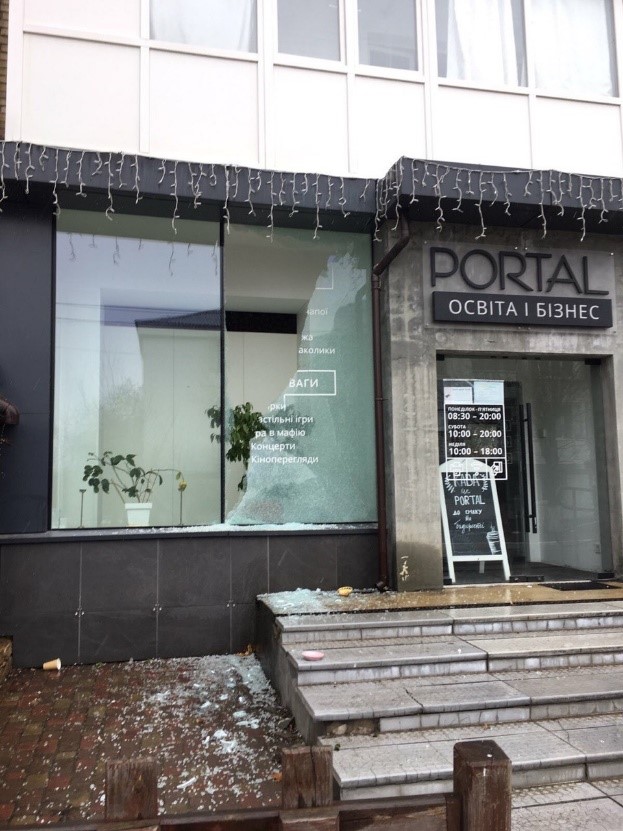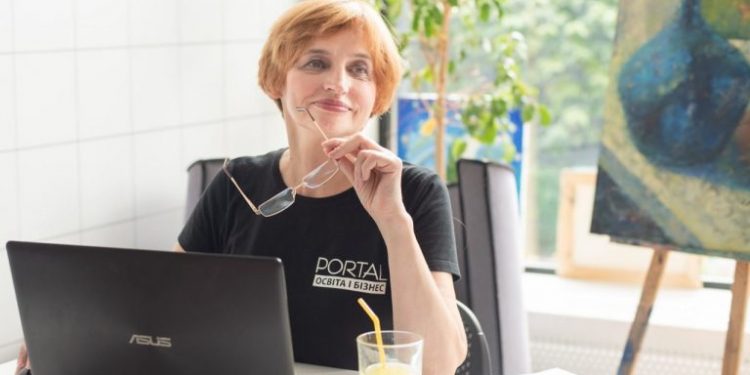Iryna Sadova is a journalist from the website “Bucha.Life.” It took her and her family nearly two weeks to escape from the occupied town of Bucha. Their family business was destroyed, and at the time, Iryna was convinced that she would never write again.
“At first, we had water and gas, but when they disappeared, we had to collect snow from cars to melt and wash our hands.”
Iryna Sadova has dedicated over 30 years to journalism. She worked for various media outlets in the Kyiv region, but her main life project became the business coworking space “PORTAL. Education and Business” in Bucha. At the beginning of the pandemic, Iryna founded her own website, “Bucha.Life,” which became the primary information platform for over 100 prominent bloggers in the city and the region.
– In our space, an active Bucha community gathered, eager to improve our beautiful town. By creating the website, we gave people a platform where they could communicate and learn something new, which was crucial because we were all confined to our homes, as you may recall. On our website, more than a hundred unique individuals shared their thoughts, periodically talking about what they were doing in Bucha or what they wanted to accomplish, – Iryna begins her story.

Iryna’s apartment windows overlook Gostomel. Around half-past five in the morning on February 24, 2022, she and her family were awakened by terrible explosions.
– We started packing our things. My kids had cars, and they tried to fuel them up, but in the end, we decided not to leave right away and wait until the majority of people had left. We gathered at the coworking space. As I walked those 10 minutes from home to the center, I saw planes and helicopters. My husband was sitting in front of the window, looking at his computer, and he said, ‘I saw a helicopter and could even make out the pilot’s face.’ However, at that time, he didn’t realize that it was the face of a Russian, – the journalist recounts.
Soon, Russian tanks broke into the center of Bucha, and enemy artillery ruthlessly shelled the city. Without a basement, Iryna’s family sat in the apartment’s corridor during the shelling.
– There were six of us in that corridor, along with a dog and a cat. At first, we had water and gas, but when they ran out, we had to collect snow from cars to melt for washing our hands. We had to be very cautious with using the bathroom because, you know, six people were cooped up at home. We had to adapt. We also learned to wash with just one cup of water, – Iryna says. – We had a Corgi dog who loved to play in the field, but surprisingly, during that time, he went out into the backyard two meters from the door, did his business, and came back. It felt like he understood everything as well.
“On the road, there was a killed cyclist… Then we saw a wrecked car with a red cross; medicines and oxygen tanks were strewn around…”
At that time, the Sadova family couldn’t leave the city because the occupiers kept breaking the evacuation agreements. Rumors began to circulate in the city that the Russians were infiltrating homes for “inspections.” On March 8, they came to Iryna’s home.
– At around 7 in the morning, we heard some banging on the wall; they were knocking on our neighbors’ doors, but no one was there. It became clear that we were next. We were prepared for this because the day before, I had just prepared material about how to act in such a situation. Perhaps that knowledge helped us survive. The commander (around 30 years old) arrived, along with 10 buryat men. They ordered us to give them our documents and phones, saying they wouldn’t take the phones, only the SIM cards. They only found three phones, as they didn’t consider that in the 21st century, even grandmothers and children have phones. They started breaking the SIM cards, and then my daughter said, ‘You live in a fantasy world. The only real thing you have is weapons.’ I froze. I signaled to her to be quiet because they could shoot us with those weapons, – Iryna recalls this episode as a terrible nightmare.
Then, the Russian occupiers eventually left, and a humanitarian corridor was announced in the city.
– We wrote ‘People,’ ‘Children,’ and ‘Evacuation’ on pieces of paper so they could identify us as civilians, and we went to the city hall where a column was gathering. When we met our acquaintances, we all started crying because we hadn’t seen each other for two weeks. We stood there waiting for buses, but they never let them into the city, – the journalist continues. – Around 4 o’clock, this stream of cars headed to Bilohorodka. I was shocked, seeing the ruins, shattered trees… On the road, there was a killed cyclist… Then we saw a wrecked car with a red cross; medicines and oxygen tanks were strewn around… It was very frightening.

“One young man asked, ‘Why isn’t the website working?’ For me, that was a sign that we should restore the website – it’s needed by people.”
Eventually, the family reached Bukovyna, where Iryna’s husband inherited a house from his father. Nobody knew for sure how long they would have to stay there, so the family started raising chickens and growing vegetables and fruits to sustain themselves.
– Although Bucha had already been liberated, we decided to stay in the village until the autumn and complete this family project. Our coworking space was severely damaged, but right after the city’s liberation, it became a distribution point for humanitarian aid. I arrived there in September. To be honest, I thought I would help with various projects and volunteers but wouldn’t write because it was emotionally challenging. However, we have a young man there – the head of the youth council – and he asked, ‘Why isn’t the website working?’ For me, that was a sign that we should restore the website – it’s needed by people, – Iryna says.

Photo: Iryna Sadova.
Currently, the internet portal “Bucha.Life” is up and running again, providing practical advice to help people. It shares useful information for local residents, volunteers, and those assisting in the town’s recovery. Additionally, Iryna has created a Facebook page and a Telegram channel where people can share new projects and ideas.
– There’s a song that always makes me cry. It’s ‘Vilni Liudy’ (Free People) by the band ‘BezObmezhennia.’ I always remember how they flip through photos of our outstanding Ukrainians in the music video and realize that only free people truly live in Ukraine. Despite everything they’ve been through, they continue to create, rebuild, and simply live, – concludes the journalist.
This series, titled Executed Free Speech, is created as part of a project Drawing Ukrainian And International Audience’s Attention To Serious Violations Of Human Rights And Crimes Against Journalists And Mass Media By The Russian Federation, which is performed by the National Union of Journalists of Ukraine, with support from the Swedish non-profit organization Civil Rights Defenders.
JOURNALISTS ARE IMPORTANT. Stories of Life and Work in Conditions of War is a cycle of materials prepared by the team of the NUJU with the support of the Swedish human rights organization Civil Rights Defenders.
#CRD

 THE NATIONAL UNION OF
JOURNALISTS OF UKRAINE
THE NATIONAL UNION OF
JOURNALISTS OF UKRAINE
















Discussion about this post